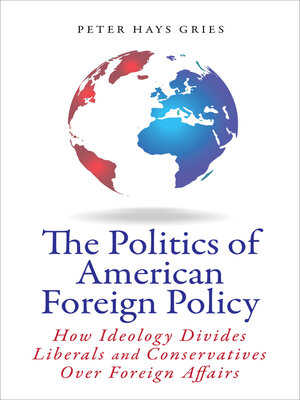The Politics of American Foreign Policy
ebook ∣ How Ideology Divides Liberals and Conservatives over Foreign Affairs
By Peter Hays Gries

Sign up to save your library
With an OverDrive account, you can save your favorite libraries for at-a-glance information about availability. Find out more about OverDrive accounts.
Find this title in Libby, the library reading app by OverDrive.



Search for a digital library with this title
Title found at these libraries:
| Library Name | Distance |
|---|---|
| Loading... |
This "eye-opening analysis" explains how and why America's culture wars and partisan divide have led to dysfunctional US policy abroad (The Atlantic).
In this provocative book, Peter Gries challenges the view that partisan elites on Capitol Hill are out of touch with a moderate American public. Dissecting a new national survey, Gries shows how ideology powerfully divides Main Street over both domestic and foreign policy and reveals how and why, with the exception of attitudes toward Israel, liberals consistently feel warmer toward foreign countries and international organizations—and desire friendlier policies toward them—than conservatives do.
The Politics of American Foreign Policy weaves together in-depth examinations of the psychological roots and foreign policy consequences of the liberal-conservative divide; the cultural, socio-racial, economic, and political dimensions of American ideology; and the moral values and foreign policy orientations that divide Democrats and Republicans. Within this context, the book explores why Americans disagree over US policy relating to Latin America, Europe, the Middle East, East Asia, and international organizations such as the UN.
In this provocative book, Peter Gries challenges the view that partisan elites on Capitol Hill are out of touch with a moderate American public. Dissecting a new national survey, Gries shows how ideology powerfully divides Main Street over both domestic and foreign policy and reveals how and why, with the exception of attitudes toward Israel, liberals consistently feel warmer toward foreign countries and international organizations—and desire friendlier policies toward them—than conservatives do.
The Politics of American Foreign Policy weaves together in-depth examinations of the psychological roots and foreign policy consequences of the liberal-conservative divide; the cultural, socio-racial, economic, and political dimensions of American ideology; and the moral values and foreign policy orientations that divide Democrats and Republicans. Within this context, the book explores why Americans disagree over US policy relating to Latin America, Europe, the Middle East, East Asia, and international organizations such as the UN.







